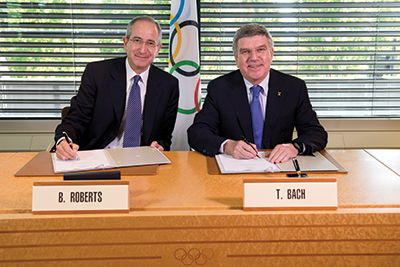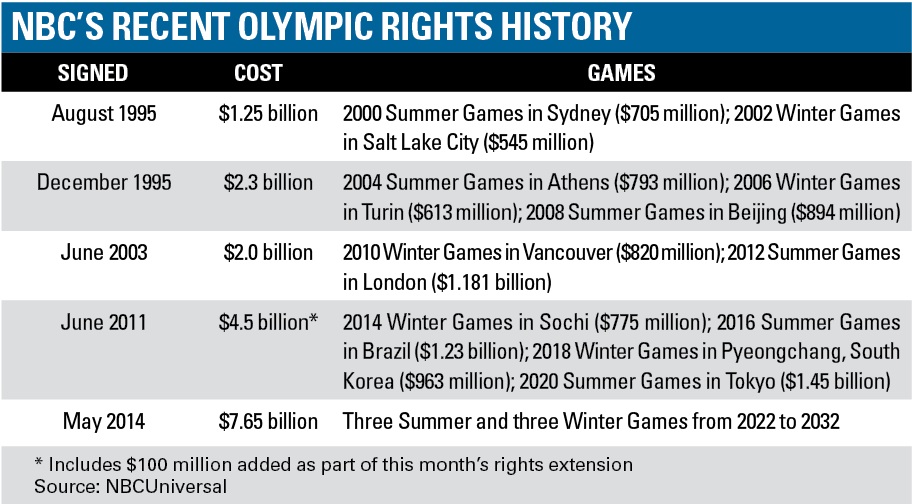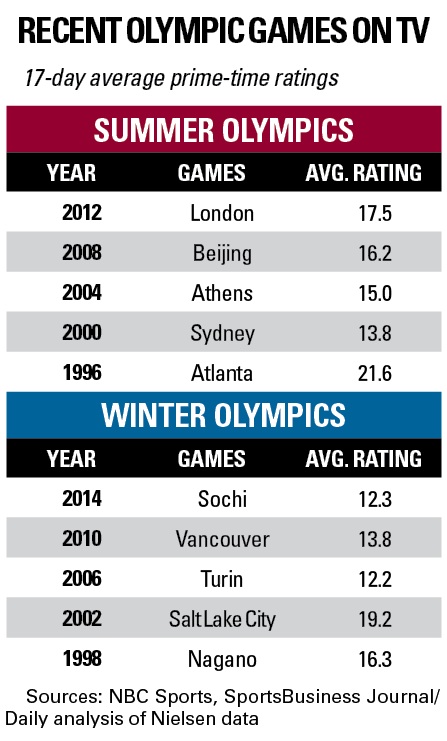When Thomas Bach campaigned to become the International Olympic Committee’s president, he ran on a platform that focused on changing the selection process for Olympic sports and strengthening anti-doping sanctions.
He never talked about the need to secure the IOC’s financial future.
But it’s clear that his organization’s financial future has been his top priority since taking office last September. In the span of three months, his organization signed deals that guarantee two huge revenue streams will remain in place for at least the next decade. The IOC followed a record sponsorship deal signed in February with Panasonic through 2024, with a massive 12-year, $7.65 billion media rights extension with NBC through 2032.
The combined deals add up to $2.7 billion for the 2021-2024 quadrennium. That’s already half of what the IOC collected for the most recent quadrennium (2009-12).
With nine more sponsorships to sell, the IOC’s primary revenue easily could rise to more than $6.4 billion between 2021-24, a 31 percent increase from the $4.9 billion it collected between 2009-12. And that’s if international TV rights stay flat at roughly $2 billion.
Financial security like that has won early praise for Bach from Olympic stakeholders.
“He understands the value of long-term partnership,” said U.S. Olympic Committee CEO Scott Blackmun. “That’s good news for the Olympic movement and partners of the Olympic movement.”
 |
Comcast CEO Brian Roberts and IOC President Thomas Bach were talking about the extension at the Sochi Games in February.
Photo by: ARNAUD MEYLAN / IOC
|
Bach’s aggressive push to secure the IOC’s financial security reflects a bigger belief in the value of long-term partnerships, according to executives who have worked closely with him. IOC executive Timo Lumme, who worked with Bach for years on European TV rights negotiations, said the German lawyer prioritizes long-term security over short-term profits.
“His philosophy always was that the best model is a long-term partnership,” said Lumme, IOC director of TV and marketing services. “Of course, there’s a financial component, but [long term] was his ideal.”
The NBC deal illustrates this point. Bach first let NBC know he was interested in a long-term extension two months after being elected president. He was in New York City for an event with the United Nations and scheduled a dinner with NBC Olympics President Gary Zenkel, IOC Director General Christophe De Kepper and Lumme.
Over dinner at DeGrezia, an Italian restaurant in Midtown, Bach floated the idea of extending NBC’s deal early. Zenkel was interested and took the idea back to his boss, NBC Sports Chairman Mark Lazarus.
The day after the opening ceremony of the Sochi Games, Zenkel and Lazarus joined Comcast CEO Brian Roberts and NBCUniversal CEO Steve Burke in the IOC presidential office at the Olympic Club. The office was on the top floor of a new building on the edge of the Olympic Park. Its windows offered views of the Olympic torch and Fisht Stadium, which hosted the previous night’s ceremony.
NBC executives arrived late in the afternoon. They recently had received their ratings report from the opening ceremony, and it showed NBC set a record for an Olympics outside North America. They told Bach, Lumme and De Kepper that they wanted to make a deal. The question everyone had was: How long?
“There was alignment that it would be long term, not just four years,” Lumme said. “The specific question was: Are we looking at more than one quad? The idea was that we should push it out. Whether it was two [quads] or three [quads] was left open.”
The parties agreed to wait until after the Olympics before re-engaging. NBC went on to generate record revenue for a Winter Games of $1.1 billion and sources familiar with NBC’s financials said it made a $100 million profit off the event. There was no doubt in anyone’s mind at Comcast and NBC that the Games were worth keeping.
“This is a unique sports property,” Roberts said last week when asked why NBC moved to keep the Games. “We’ve been fortunate to be profitable since we got involved in the Olympics with London and Sochi. We have a lot more experience. This long-term partnership allows you to invest and innovate.”
Zenkel traveled to the IOC’s headquarters in Lausanne, Switzerland, in March with a green light to cut a deal. He met with Bach, Lumme and De Kepper. They quickly reached consensus on a $7.65 billion deal for six Olympics, from 2022 through 2032. They ended the negotiation with a handshake.
The IOC looped USOC Chairman Larry Probst and Blackmun into the conversation in March, jump-starting contract negotiations. De Kepper, Lumme and Zenkel worked with NBC attorneys and the IOC’s lawyers at O’Melveny & Myers to finalize the agreement. They worried at times that news of the negotiation might leak to the press and did their best to limit who knew about it. Between the IOC, NBC and USOC, fewer than 15 people knew the deal was close.
They scheduled a signing ceremony last week, set for the day after the Sports Emmys in New York. Lazarus, who attended a luncheon honoring his family in New York that day, skipped the Emmys that night and flew to Switzerland instead. When people asked where he was, they were told he was sick.
Blackmun didn’t tell his chief of communications, Patrick Sandusky, that he would be traveling to Switzerland until a few days before the trip, and even then he was guarded about why. Officials even sneaked around the IOC headquarters last Wednesday because they wanted to avoid being seen by TOP sponsorship executives who were there, coincidentally, for a Sochi recap meeting.
“We were all aware of how important keeping it quiet was to making the deal happen,” Blackmun said. “It was self-interest. Everybody was advised that this was on a need-to-know basis.
The secretive nature of the talks stood in contrast to the way the IOC’s previous two TV rights negotiations were handled. Under Bach’s predecessor, Jacques Rogge, the IOC held formal bidding processes in 2003 and 2011 where networks made presentations and offers to IOC members in Lausanne.
NBC won the most recent auction in 2011, besting bids from Fox and ESPN by more than $1 billion. It agreed to pay $4.4 billion for the 2014-2020 Olympics.
NBC’s new deal represents only a modest increase of 15 percent per Games over that agreement.
Lumme said the IOC debated whether it could get more revenue from an auction process in the future but ultimately decided it was more important to have a long-term agreement with a partner it trusted than make a few extra dollars. Bach championed the upside of a long-term partnership and the financial security it offered.
“You know, you can maybe — in one deal you can make one or the other dollar more and maybe have your product destroyed,” Bach said last week. “We are thinking long term in the IOC. We are here for 120 years, and we want to be there much longer. We want to leave a good legacy there to our successors.”
The IOC and NBC celebrated their deal with a private dinner at the luxurious Lausanne Palace Hotel, the same place the IOC and NBC celebrated the deal they signed in 2011. But unlike three years ago, when the event was held in the hotel’s ballroom and attended by a host of NBC staff and IOC executives, this was a smaller, more intimate affair.
A crowd of about 40 people gathered in a brightly lit, private room with starched white tablecloths. Bach took a seat at the center of the table. Lazarus sat to his right, Probst to his left.
During the two-hour dinner that featured rack of veal with wild mushrooms, Bach, Roberts and Zenkel gave toasts. Each spoke about the importance of a long-term relationship and their joint commitment to promoting the Olympics for years to come.
Bach was jovial and relaxed. He’d been questioned earlier in the day about cutting a deal that fell far short of the enormous rights increases other sports properties were getting in the U.S., but he didn’t care. He liked the deal, and he liked being surrounded by people he trusted.







